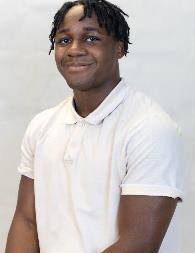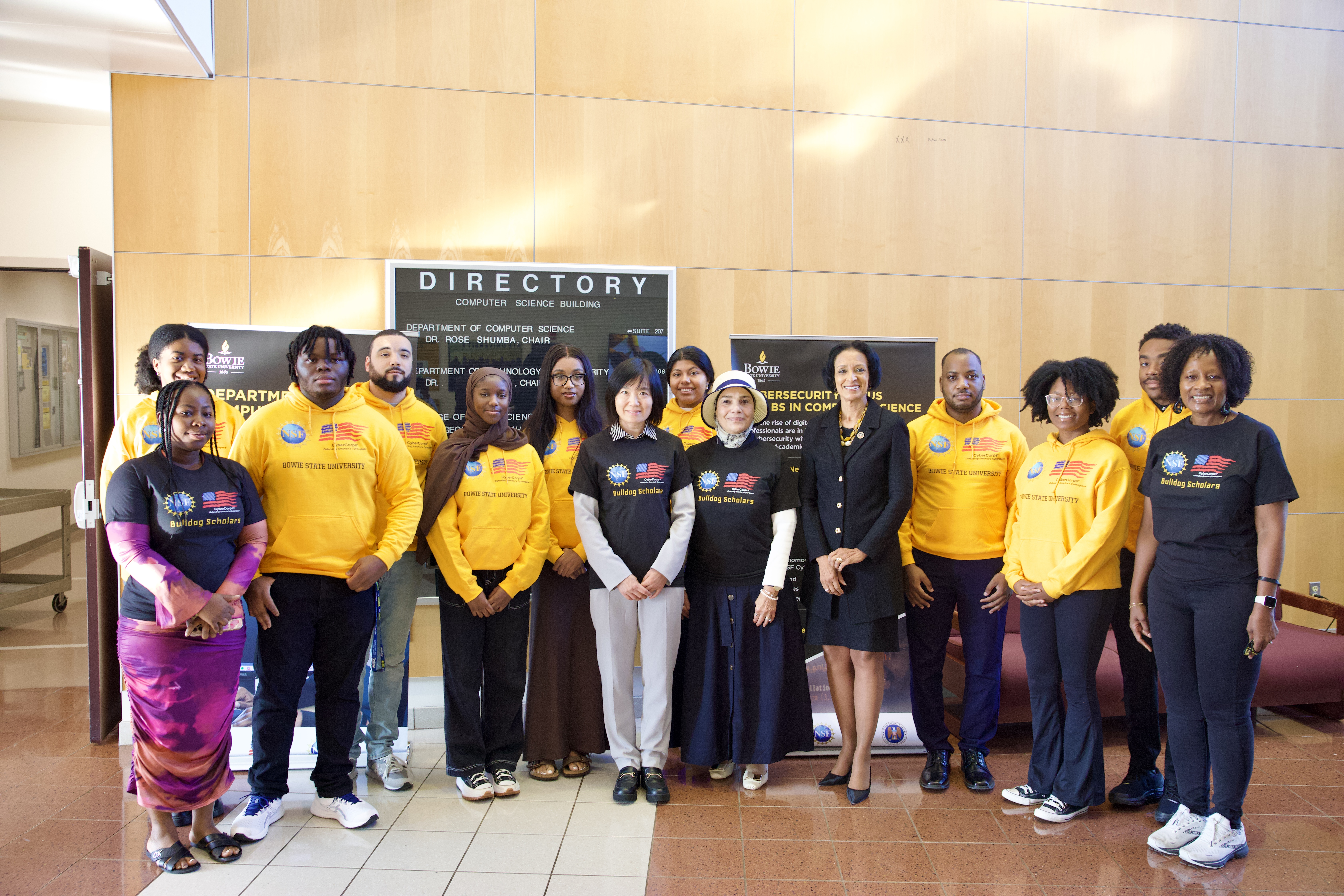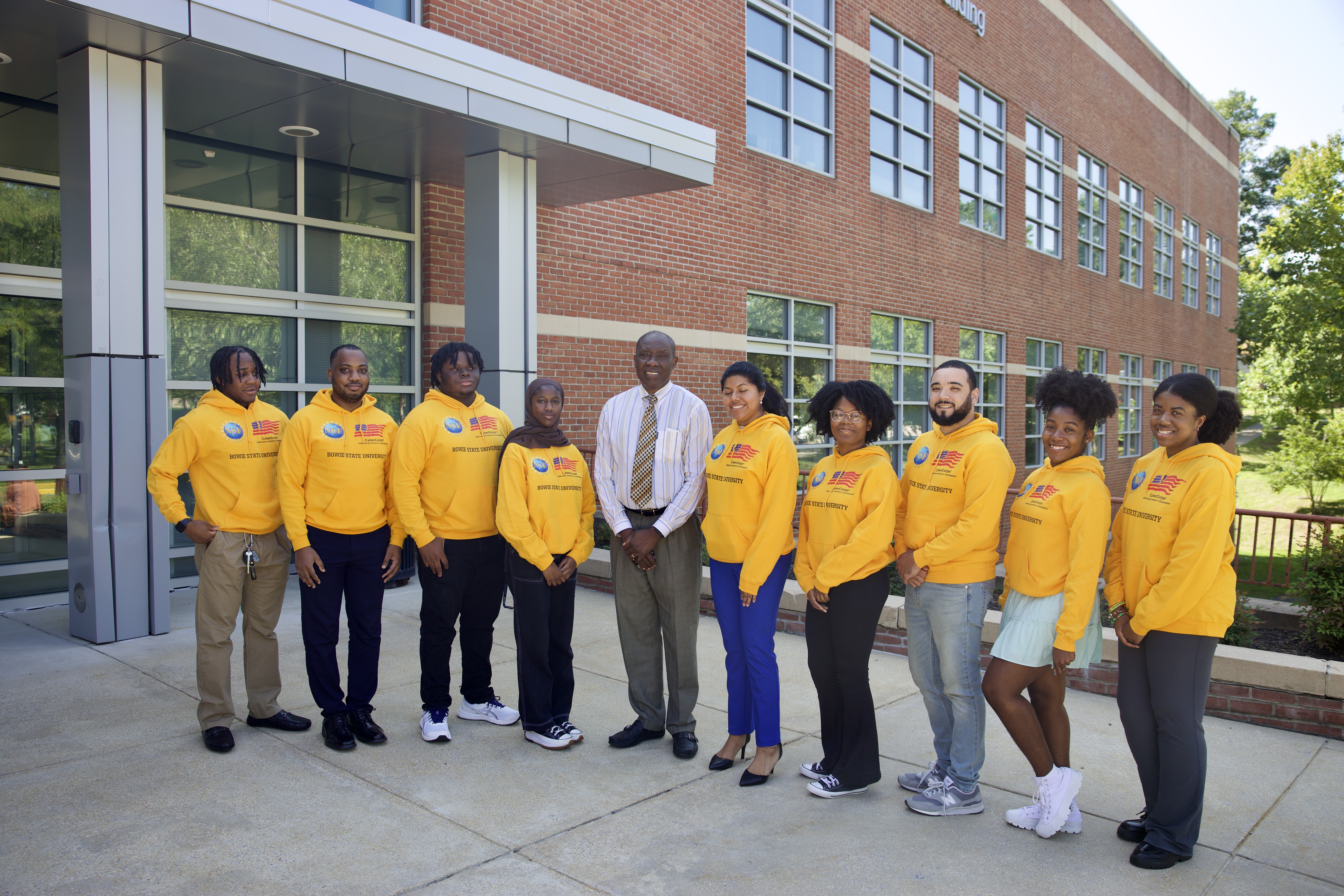SFS Scholars Cohort II
SFS Scholars Cohort II
The Scholarship for Service (SFS) program at Bowie State University, sponsored by the National Science Foundation (NSF), proudly introduces its second cohort of scholars. This prestigious program prepares students for careers in cybersecurity, providing them with financial support, mentorship, and opportunities for cutting-edge research. Faculty mentors, including Dr. Jie Yan, Dr. Avijoy Chakma, Dr. Sarker Kamruzzaman, and Dr. Vivek Mayura Shandilya, lead innovative projects focused on image forensics, scalable machine learning, malware detection, and attack identification. The SFS scholars also have the chance to engage in paid internships with government agencies, equipping them with the hands-on experience and skills needed to address critical cybersecurity challenges and contribute to national security.
Faculty Research Mentors
Dr Ji Yan
 A professor in the Department of Computer Science and the Director of Machine Perception & Animation lab and Cybersecurity Application Lab at Bowie State University. She isalso the faculty lead for center for Cyber Security and Emerging Technologies. Her areas of expertise include Computer Graphics, Computer Vision, Machine Learning, and Cybersecurity Education. Abstract: Differentiating real or authentic images from manipulated or fake imagery is significant for image forensics domain and the public. Researchers tend to develop very complicated deep learning architectures to train detector models making the process of fake image detection expensive to the public and limiting model usability.The goals of this research project are : 1) to develop a robust forensic analyzer to detect authentic from counterfeit images using deep learning and a less expensive lightweight device with less computing power, 2) to produce a Raspberry Pi- based analyzer model that will be accessible to the general public, 3) to determine the best framework for image classification using raspberry pi, 4) to evaluate the performance of three frameworks in terms of image classification accuracy and model inference speed on IoT raspberry Pi device and, 5) to evaluate the performance of three types of strategies in terms of average detection accuracy and model complexity based on the best-performed framework.
A professor in the Department of Computer Science and the Director of Machine Perception & Animation lab and Cybersecurity Application Lab at Bowie State University. She isalso the faculty lead for center for Cyber Security and Emerging Technologies. Her areas of expertise include Computer Graphics, Computer Vision, Machine Learning, and Cybersecurity Education. Abstract: Differentiating real or authentic images from manipulated or fake imagery is significant for image forensics domain and the public. Researchers tend to develop very complicated deep learning architectures to train detector models making the process of fake image detection expensive to the public and limiting model usability.The goals of this research project are : 1) to develop a robust forensic analyzer to detect authentic from counterfeit images using deep learning and a less expensive lightweight device with less computing power, 2) to produce a Raspberry Pi- based analyzer model that will be accessible to the general public, 3) to determine the best framework for image classification using raspberry pi, 4) to evaluate the performance of three frameworks in terms of image classification accuracy and model inference speed on IoT raspberry Pi device and, 5) to evaluate the performance of three types of strategies in terms of average detection accuracy and model complexity based on the best-performed framework.
Avijoy Chakma
 A incoming Assistant Professor in the Computer Science department at Bowie State University. He completed his Ph.D. in Information Systems from the University of Maryland, Baltimore County, in July 2023. He received a Bachelor of Science degree in Computer Science and Engineering from the Bangladesh University of Engineering and Technology in 2013 and a Master of Science degree in Computer Science from Lamar University, Texas, in 2018. Before his graduate study, he had 2.5 years of experience working in the software industry. He has published multiple peer- reviewed journals and conference papers, and he is the recipient of the Best Paper Award at the IEEE/ACM CHASE Conference 2022. During his Ph.D., he actively supervised multiple Summer Research Experience for Undergraduates (REU) students. His research interests are cyber-physical systems, smart health, and machine learning. Title: Cross-domain Sensing & Modeling for Smart Environments
A incoming Assistant Professor in the Computer Science department at Bowie State University. He completed his Ph.D. in Information Systems from the University of Maryland, Baltimore County, in July 2023. He received a Bachelor of Science degree in Computer Science and Engineering from the Bangladesh University of Engineering and Technology in 2013 and a Master of Science degree in Computer Science from Lamar University, Texas, in 2018. Before his graduate study, he had 2.5 years of experience working in the software industry. He has published multiple peer- reviewed journals and conference papers, and he is the recipient of the Best Paper Award at the IEEE/ACM CHASE Conference 2022. During his Ph.D., he actively supervised multiple Summer Research Experience for Undergraduates (REU) students. His research interests are cyber-physical systems, smart health, and machine learning. Title: Cross-domain Sensing & Modeling for Smart Environments
Abstract:
Cyber-physical systems that create smart environments are associated with multiple sensing mechanisms to interact with and understand the physical world. Efficiently aggregating and processing multi-stream data and developing adaptive machine learning models to make actionable decisions is not trivial. Often, smart sensing (such as smartphones, smartwatches, Google Home, etc.) device provided data sources differ significantly from one data source to another. Most existing machine learning approaches need to be more adaptive and scalable to handle such variations. Therefore, developing scalable machine learning models under the presence of multi-stream, multi-modal data sources with labeled and unlabeled information is a challenging avenue to investigate. In this talk, I will discuss the underlying causes of data source variations, how to overcome such data variations to process multiple streams concurrently, and how to develop a scalable, robust machine learning model.
Dr. Sarker Kamruzzaman
 Dr. Sarker’s primary research area is Trustworthy Artificial Intelligence and its applications. His ongoing work seeks to enhance the reliability of AI systems by improving their ability to explain decisions in simple terms, validating the effectiveness of these explanations, and employing knowledge graphs for clearer insights. Additionally, he investigates AI applications in cybersecurity, with recent projects focused on real-time malware detection and secure log-in systems.
Dr. Sarker’s primary research area is Trustworthy Artificial Intelligence and its applications. His ongoing work seeks to enhance the reliability of AI systems by improving their ability to explain decisions in simple terms, validating the effectiveness of these explanations, and employing knowledge graphs for clearer insights. Additionally, he investigates AI applications in cybersecurity, with recent projects focused on real-time malware detection and secure log-in systems.
Title: Malware detection using Deep Learning
Abstract:
Malware detection is crucial due to the significant threats it poses to both individual systems and networks. Our research explores the effectiveness of deep learning in adapting to new threats by leveraging diverse datasets. We employ both traditional and advanced deep learning models for preprocessing, augmenting, training, and detection, working with large datasets such as the SoReL-20M, which contains approximately 20 million samples. Our research has led to improved model performance, enhancing resilience and versatility in detecting and classifying malware. Despite these advancements, the constant emergence of new malware requires ongoing efforts to stay ahead of evolving threats.
Dr. Vivek Mayura Shandilya
 Title: On Attack graphs and Attack trees in Attack identification
Title: On Attack graphs and Attack trees in Attack identification
Abstract:
Both attack graphs and attack trees are used as a framework to identify probable attacks using the information from the sensors detecting anomalies in the networked system behaviors. These anomalies could be caused by both malicious intrusions or internal malfunctioning either prompted by external malicious attacks or internal attacks. A rare case of benign system fault could also be a cause. With the technological improvements in attack graph and attack tree generations, and appropriate computational modeling, here we present a study/ survey of the latest works on both the technologies and the methodologies to present the state of art solutions in the field.
SFS Cohort II

Haley Baley is a seasoned IT professional, with cybersecurity training with advanced comprehensive training in back-end security, threats, and a background in hardware configurations, with a passion for cybersecurity.
 Brandon Wiggins is a full-time student pursuing a BS in Computer Science with a concentration in Cybersecurity at Bowie State University, expected to graduate in 2026. He holds an associate's degree in business management with a cybersecurity certificate from Eastern Gateway Community College, completed in 2023. Brandon is passionate about computer science and cybersecurity, with skills in Python and Java. My core strengths include attention to detail, communication, teamwork, and analytical thinking. His goal is to leverage his skills to enhance the security of information systems and contribute to advancements in cybersecurity.
Brandon Wiggins is a full-time student pursuing a BS in Computer Science with a concentration in Cybersecurity at Bowie State University, expected to graduate in 2026. He holds an associate's degree in business management with a cybersecurity certificate from Eastern Gateway Community College, completed in 2023. Brandon is passionate about computer science and cybersecurity, with skills in Python and Java. My core strengths include attention to detail, communication, teamwork, and analytical thinking. His goal is to leverage his skills to enhance the security of information systems and contribute to advancements in cybersecurity.
 Isha Renner is a driven college student, who is passionate about integrating her academic pursuits in computer science with her interest in cybersecurity. Isha has excelled in both coursework and hands-on internships, including participating in the NSA's Hacking 4 Intelligence program. Additionally, being a member of the Honors Program underscores her commitment to academic excellence. Outside of academics, she enjoys video editing, skateboarding, and soccer. Isha looks forward to contributing to innovative solutions in cybersecurity.
Isha Renner is a driven college student, who is passionate about integrating her academic pursuits in computer science with her interest in cybersecurity. Isha has excelled in both coursework and hands-on internships, including participating in the NSA's Hacking 4 Intelligence program. Additionally, being a member of the Honors Program underscores her commitment to academic excellence. Outside of academics, she enjoys video editing, skateboarding, and soccer. Isha looks forward to contributing to innovative solutions in cybersecurity.
 Tobi Ayodeji is a rising junior majoring in Computer Science with a concentration in Cyber Security. He is currently an AI intern at MITRE, following his Software Engineering internship there in 2023. Tobi also has experience in bioinformatics research and have worked as a junior system administrator.
Tobi Ayodeji is a rising junior majoring in Computer Science with a concentration in Cyber Security. He is currently an AI intern at MITRE, following his Software Engineering internship there in 2023. Tobi also has experience in bioinformatics research and have worked as a junior system administrator.
 Titorian Huggins is currently a Junior at Bowie State University majoring in Computer Science. After being accepted into the prestigious SFS Scholar program, Titorian’s focus have shifted toward Cybersecurity. He is honored to have this opportunity, and he is eager to collaborate with and learn from new colleagues. Titorian looks forward to contributing his skills to the program and achieving success as an SFS Scholar.
Titorian Huggins is currently a Junior at Bowie State University majoring in Computer Science. After being accepted into the prestigious SFS Scholar program, Titorian’s focus have shifted toward Cybersecurity. He is honored to have this opportunity, and he is eager to collaborate with and learn from new colleagues. Titorian looks forward to contributing his skills to the program and achieving success as an SFS Scholar.



